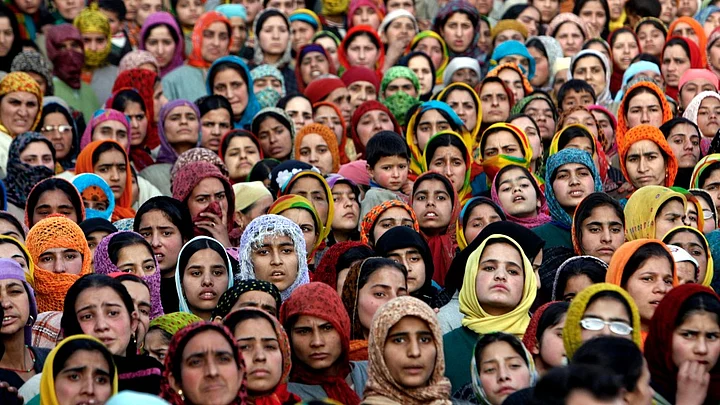Now that Bombay High Court has allowed women inside the sanctum sanctorum of Haji Ali shrine in Mumbai, activists are preparing for the next big fight: Entry of women inside mosques.
The Telegraph reported in January that a group of women moved the Supreme Court demanding entry for women into all mosques in the country.
Islamic scholars ridiculed the petition saying entry of women inside mosques is not banned at all. Practically speaking, it may not have been banned by the Holy Book, but there is an unwritten ban at most places in India.
Women are allowed to enter those mosques which have a separate space for them, but most of them India do not have such spaces. Socially, Indian women are not encouraged to regularly pray at mosques even if they do have separate spaces alloted for them.
Activists like Zakia Soman of the Bharatiya Muslim Mahila Andolan blame the patriarchal mindset of a group of clerics and local masjid committees for this.
Is It Faith vs Equality?
While the debate rages in courts and on social media, The Quint’s office is no exception. The moment this topic was brought up, Isha and Sabika fiercely debated over unequal status of women in religious structures. Here are some of the excerpts:
Sabika: Women are allowed in mosques provided there is a separate section demarcated for them. Women and men cannot pray standing next to each other. That’s the only reason why women don’t enter mosques. Sometimes there’s barely enough space to accommodate men. It’s not really a question of “equality”.
Isha: Sabika, it is kind of giving priority to men when you say only the leftover space is demarcated for women. Also, why should there be demarcated space in any place of worship to begin with? The argument that there is “barely enough space to accommodate the men” should ideally be that there is barely enough space to accommodate everyone, no? And that is an entirely different problem.
Sabika: Isha, women and men cannot pray in the same space. That’s the ethos of Islam. Absolute basics. That’s why the demarcation. It’s not an equality issue. It just IS.
In India, women cannot pray inside some mosques because of the space issue. At least to my understanding. I feel that happens because they don’t plan their spaces very well. Then again I come from an urban city like Mumbai where I haven’t had to deal with anyone telling me NOT to pray in a mosque.
Men HAVE to go for prayers every Friday to the mosque. Its not compulsory, but a generally good practice to do that. Women do not HAVE to. If they do, it’s only a good thing. It’s culturally wrong to not allow a woman to go to a mosque to pray if she wants to.
Isha: Sabika, organised religion is not something handed down to us. People (mostly men) wrote scriptures and therefore it IS an equality issue. Who decided men and women cannot pray in the same space? and why? Our very religions — all of them —are patriarchal, and we must acknowledge that.
In this day and age, can we let “It just is” be a logical answer to these questions? “It just is” is the same answer Hindu women are given when they ask why they cannot enter places of worship when they are menstruating. It is also the same reason given when sects within Christianity insist that men not use condoms.
Sabika: I disagree. And that is my personal opinion.“People (mostly men) wrote scriptures and therefore it IS an equality issue.” Is that scientifically correct? Can you prove it?
Isha: That the Haji Ali dargah will allow entry to women is a cause for celebration, because it is a victory for religious freedom. As citizens of the country, we are constitutionally entitled to worship as we please, regardless of our gender.
As women fighting for equality, we must remember that most organised religions are inherently patriarchal. This is not a problem within Islam only; organised religion is patriarchal because they evolved in worlds and societies that were patriarchal.
We cannot excuse religion for being discriminatory because it is the word of god. Our religious practices must evolve with us, if they are to be truly liberating.
Sabika: Religious freedom was always ours. This is a freedom from cultural shackles and minds that believe they need to dictate what women can and cannot do.
Jama’at (Friday prayer) while not being
compulsory is mustahab meaning it yields extra bonus points if
done (in layman’s language). And because adequate arrangements are not
made, women cannot gather in huge numbers. This
is also because there are various rules of jama’at that must be
followed. Something that India has been very far behind in planning and
implementing.
Nobody can stop me/all women out there from visiting the shrine of any holy figure/entering any religious space. That’s not written anywhere! Don’t impose that on me.
